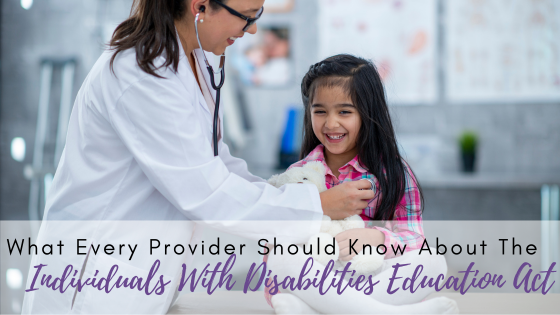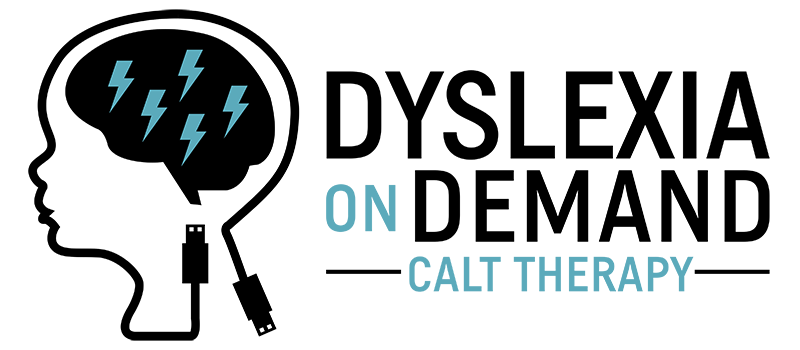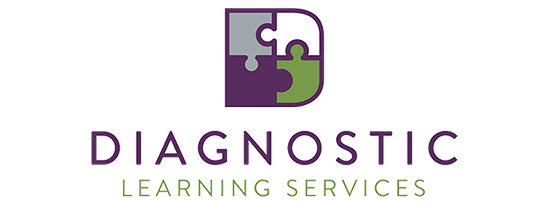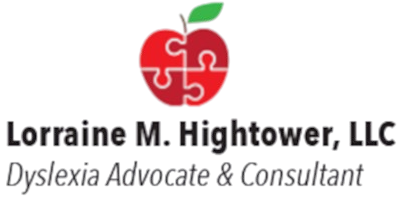
What Every Provider Should Know About The Individuals With Disabilities Education Act
Providers are such an important part of a patient’s whole support system. When it comes to pediatric patients who have learning disabilities like dyslexia, doctors have the potential to help with so many different areas of this diagnosis; some facets providers can help with include early intervention, collaboration with teachers, professionals, and families, advocacy, communication, healthy habits, and mental health. Early diagnosis of dyslexia is key, and providers can help to guide families to qualified specialists that can offer further evaluation and support.
When advocating or collaborating, it is so important for providers to know about the legislation surrounding learning disabilities like dyslexia in order to help patients thrive in school. Read on to learn about what every provider should know about the Individuals with Disabilities Education Act.
A bit about the Individuals with Disabilities Education Act (IDEA): This critical piece of legislation for education in the United States guarantees free and appropriate education for children with disabilities who range in age from birth to 21-years-old. IDEA applies to all public U.S. schools that receive federal funding. It encompasses 13 different categories of disabilities, including specific learning disabilities like dyslexia.
The Individuals with Disabilities Education Act includes some key provisions: Some students require written documents provided by their schools, which outline their specific needs, goals, and services; these are known as individualized education programs or IEPs, which are provided for by the IDEA. IDEA also requires that students are educated in the least restrictive environment (LRE), preferably in an inclusive, typical classroom setting. This act also ensures that schools must notify parents or guardians before any changes are made to a child’s education plan. There are also various procedural safeguards put in place for parents or guardians to have rights to participate in decision-making, resolving disputes, and a student’s independent evaluations. Talking about these provisions with families can help to establish a bigger picture of your patient’s experience with dyslexia.
Talking about IDEA with patients: IDEA is a complex law with many nuances, but it can be helpful to ensure that patients and families are aware of certain benefits it could provide. Focus on the positive purpose of IDEA—to help children with learning disabilities. When discussing IDEA with younger patients, be sure to use clear, concise language, and avoid complex legal explanations. Invite patients to ask about aspects they don’t understand.
Empower patients: Help patients to understand how IDEA can give them and their families a voice in their education; IDEA ensures that they receive the support that they deserve.
Offer resources: Helping patients to navigate their journey with dyslexia can make such a great impact on their lives. There are many books and websites to explore such as the Department of Education’s IDEA Website or the National Center for Learning Disabilities website. There are also great programs in dyslexia therapy that can help students outside of their classroom such as Dyslexia on Demand.
Dyslexia on Demand can help you to help your patients. Deciding on the right resources for your patients is so important, and we are here to help. Dyslexia on Demand has highly trained professionals—Certified Academic Language Specialists (CALTs)—to help patients to succeed both academically and socially. Together, CALTs and an Orton-Gillingham-based dyslexia program that they implement represent the gold standard in dyslexia therapy. Our dyslexia therapy programming is comprehensive, multi-sensory, explicit, and systematic.
We offer help for patients with all different learning styles. Pediatric providers want the best for their patients, and so do we. Dyslexia on Demand helps to provide a dynamic, tailored dyslexia therapy program that is prescriptive to the specific needs of each child. There’s not a one-size-fits-all approach to dyslexia treatment. For example, our online program at Dyslexia on Demand supports children with ADHD and provides an interactive, engaging program that allows students to maintain focus and motivation during their sessions. Our curriculum is comprehensive, flexible, and adaptable. With Dyslexia on Demand, students receive just the right pacing, intensity, and curriculum layering for them to succeed.
Refer your patients to Dyslexia on Demand for dyslexia therapy and support. It can be so frustrating for patients who struggle with dyslexia, and discussing this learning disability with parents and caregivers can be tough. Dyslexia on Demand does not require an official diagnosis for students to begin therapy. Our referral process is easy; patients can connect with us for an initial consultation and get answers to any questions they may have about dyslexia therapy. We can even diagnose dyslexia at an “at-cost” rate.
As a provider, you have the ability to help change the lives of students who struggle with learning disabilities like dyslexia by offering great resources. Reach out to Dyslexia on Demand today to learn more about how we can help. Our experienced, dedicated team of dyslexia therapists use evidence-based, therapeutic-level approaches that help students to overcome their struggles with reading, spelling, and writing.
Reach out to Dyslexia on Demand. Learn why dyslexia therapy may be the best option for your patients. Discover more on our website, or request more information.












